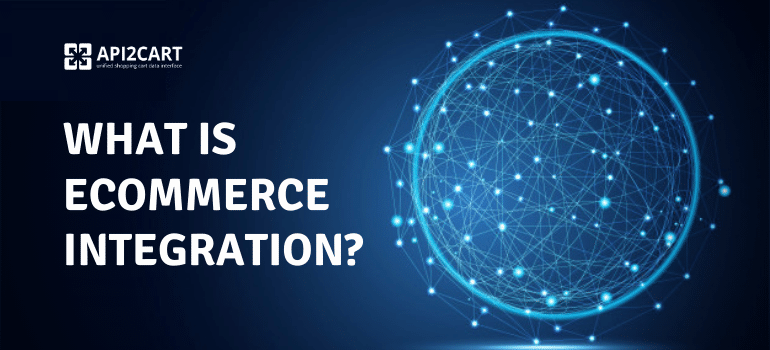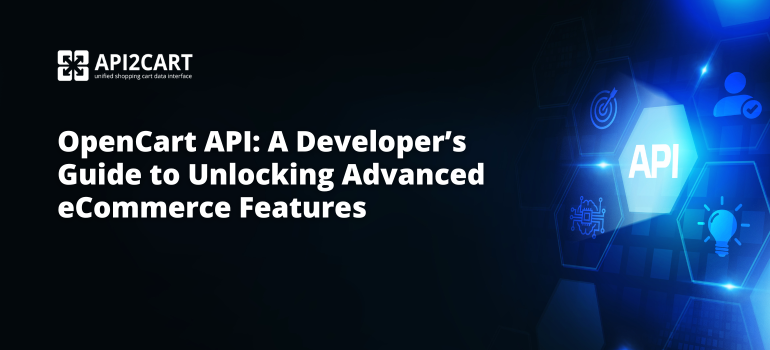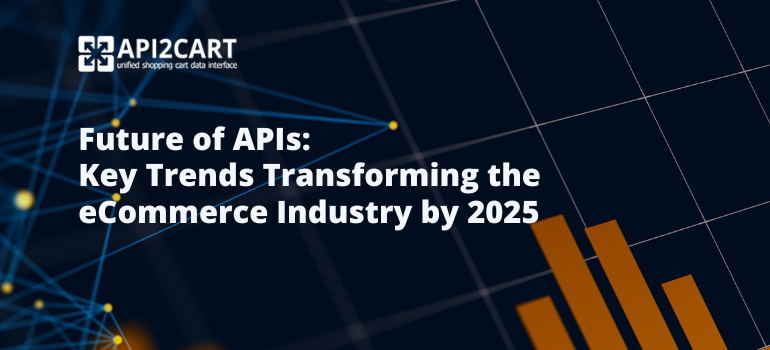
Running SaaS for eCommerce businesses? Then building reliable eCommerce integration is no longer optional. The more platforms you support, the easier it becomes to attract new clients and scale your product. In today’s competitive market, both eCommerce integration and ecommerce systems integrations directly impact your growth potential and position your product as a scalable ecommerce integration solution.
According to Grand View Research, the global Integration Platform as a Service (iPaaS) market is expected to exceed $30 billion by 2030, driven by cloud adoption and multi-channel commerce complexity. As businesses rely on multiple platforms, marketplaces, and SaaS tools, demand for a flexible ecommerce integration solution continues to grow rapidly.
This article explores the top eCommerce platforms for connection, common challenges of building custom integrations, and how a unified API approach can simplify the process. You’ll also see how API2Cart helps SaaS vendors accelerate development while reducing integration costs.
What is eCommerce Integration?
In simple terms, eCommerce integration is the process of connecting different software systems and platforms used in online selling. As a result, this integration enables smooth data sharing between systems, making business operations faster, more accurate, and easier to manage.
More specifically, for eCommerce software providers, this integration means linking their applications to shopping platforms and marketplaces. In this way, eCommerce data integration facilitates the exchange of critical store information, such as product details, customer data, orders, shipments, and shopping carts.
For example, if you are running a repricing software and your clients build their stores on Shopify, you need reliable access to price data from Shopify. Otherwise, without integration and structured data access, your software will not be able to update prices or perform other essential operations in real time.
Therefore, regardless of the type of software you provide for online retailers, you must establish a stable connection with the shopping platforms your clients use. In other words, integration becomes the foundation of your product’s functionality and value.
What Are the Benefits of eCommerce Integration for Software Providers?
For SaaS vendors, integrations are not just an additional feature — in fact, they define long-term product competitiveness. In today’s ecosystem, a scalable ecommerce integration solution allows your software to connect with multiple platforms and, at the same time, deliver consistent data synchronization across systems.
Competitive advantage
To begin with, the eCommerce SaaS market is highly competitive. New platforms and tools appear constantly, and customer expectations continue to rise. Therefore, by expanding platform coverage, your ecommerce integration solution becomes significantly more attractive to merchants operating across multiple environments.
Moreover, supporting more platforms reduces friction during onboarding and simplifies technical evaluation. As a result, sales cycles become shorter, and your product gains a clear competitive edge.
Access to a larger market
In addition, the broader your integration coverage, the larger your potential client base becomes. According to BuiltWith, WooCommerce powers millions of live stores worldwide, while Shopify and Magento remain among the leading global platforms.
Consequently, by connecting to major platforms, your ecommerce integration solution gives you access to merchants across North America, Europe, and fast-growing emerging markets.
Flexibility for your clients
At the same time, modern merchants rarely sell on a single channel. Instead, they operate across marketplaces, storefronts, and social platforms. Therefore, your software must support centralized and reliable data management.
A robust ecommerce integration solution enables accurate inventory synchronization, real-time order updates, and consistent product management across platforms. In other words, it becomes the technical backbone of multi-channel operations.
If you provide shipping software, ERP, OMS, PIM, or marketing automation tools, integration is not optional — rather, it is a core infrastructure requirement.
With that in mind, let’s examine the most popular eCommerce platforms SaaS vendors typically prioritize for integration.
Why Is Custom Integration So Challenging?
At first glance, building integrations manually may seem manageable. However, without a scalable ecommerce integration solution, this approach quickly becomes expensive and difficult to maintain over time.
1. High Development Time and Cost
First of all, each platform has its own API structure, authentication flow, and data logic. As a result, custom development can take weeks or even months. Consequently, your roadmap slows down and engineering costs increase.
2. Ongoing Maintenance
Moreover, eCommerce platforms frequently update APIs, data formats, and security requirements. Therefore, without a centralized ecommerce integration solution, your team must constantly monitor changes and rewrite code to remain compatible.
3. Limited Scalability
In addition, adding integrations one by one does not scale. As your client base grows, new platform requests appear. Thus, manual development makes it difficult to keep pace with market demand.
4. Inconsistent Data Structures
Furthermore, every platform organizes products, orders, customers, and inventory differently. Because of this, manual mapping increases complexity and the risk of errors. Ultimately, data standardization becomes time-consuming and unstable.
5. Delayed Time to Market
At the same time, when engineers focus on building and fixing integrations, innovation slows down. As a consequence, new features and platform support take longer to release, reducing your competitive advantage.
6. Risk of Bugs and Downtime
Additionally, custom integrations increase the likelihood of synchronization errors and system instability. If issues occur, downtime or incorrect data can damage client trust and disrupt business operations.
7. Reduced Focus on Core Product
Finally, engineering resources are limited. Without a reliable ecommerce integration solution, developers spend more time maintaining connections instead of improving core product functionality and user value.
Major eCommerce Platforms Comparison
| Platform | Type | API Quality | Webhooks | Integration Complexity | Pricing Model | Rate Limits | Best For |
|---|---|---|---|---|---|---|---|
| Shopify | SaaS | ★★★★★ | Yes | Low | $29–299/mo | Depends on API type | SaaS apps, fast onboarding |
| WooCommerce | Open-source | ★★★★☆ | Plugin-based | Medium | Free | Server-dependent | Custom & SMB |
| BigCommerce | SaaS | ★★★★☆ | Yes | Medium | $29–299/mo | Varies by plan | Mid-market SaaS |
| Adobe Commerce (Magento) | Enterprise / Open-source | ★★★★☆ | Yes | High | Enterprise license | Varies | Enterprise merchants |
| Wix | SaaS | ★★★☆☆ | Partial | Low–Medium | Tiered plans | Varies | SMBs |
| PrestaShop | Open-source | ★★★☆☆ | Limited | Medium | Free | Server-dependent | EU SMBs |
| OpenCart | Open-source | ★★★☆☆ | Limited | Medium | Free | Server-dependent | Lightweight stores |
| Shopware | Open-source / Enterprise | ★★★★☆ | Yes | Medium | Freemium + Enterprise | Varies | DACH & EU markets |
| Salesforce Commerce Cloud | Enterprise SaaS | ★★★★☆ | Yes | High | Contract | Varies | Global brands |
| SAP Commerce Cloud | Enterprise | ★★★★☆ | Yes | High | Contract | Varies | Large enterprises |
| commercetools | Composable | ★★★★★ | Yes | High | Usage-based | Varies | Headless commerce |
| Amazon | Marketplace | ★★★★☆ | Yes | High | Seller fees | Strict rate limits | Marketplace expansion |
| eBay | Marketplace | ★★★★☆ | Yes | Medium | Seller fees | Varies | Global marketplace |
| Walmart | Marketplace | ★★★★☆ | Yes | High | Seller fees | Strict limits | US retail expansion |
| Etsy | Marketplace | ★★★☆☆ | Partial | Medium | Seller fees | Varies | Niche & handmade |
| TikTok Shop | Marketplace | ★★★☆☆ | Yes | Medium | Commission-based | Varies | Social commerce |
Rate limits and API capabilities may vary depending on the plan, region, and API version.
API2Cart - the Best eCommerce Integration Service
There are multiple eCommerce platforms your software can integrate with. However, if you want to succeed in the B2B software market and expand the number of your potential customers, we recommend developing eCommerce platform integration with the ones we’ve listed above.
How API2Cart Simplifies eCommerce Integration?
You must keep in mind that the process of integration involves technological complexity, a huge budget, and months of your developers’ work. However, you can try one of the best eCommerce integration services that will help you to overcome such difficulties.
API2Cart provides a unified API for integration with 60+ eCommerce platforms and marketplaces at once. This list includes Shopify, WooCommerce, Magento, OpenCart, PrestaShop, Etsy, Wix, Shopee, Temu, TikTok Shop, Flipkart, and other popular platforms. All you need to do is to connect your app with API2Cart and enjoy the result.

You will be able to work with all the data required from your clients’ stores. It includes managing the information connected with products, orders, shipments, customers, baskets, etc.
Here is how the response structure of order.list method for eCommerce integration looks like:
{
"return_code": 0,
"return_message": "string",
"pagination": {
"previous": "string",
"next": "string",
"additional_fields": {},
"custom_fields": {}
},
"result": {
"orders_count": 0,
"order": [
{
"id": "string",
"order_id": "string",
"basket_id": "string",
"channel_id": "string",
"customer": {
"id": "string",
"email": "string",
"first_name": "string",
"last_name": "string",
"phone": "string",
"additional_fields": {},
"custom_fields": {}
},
"create_at": {
"value": "string",
"format": "string",
"additional_fields": {},
"custom_fields": {}
},
"currency": {
"id": "string",
"name": "string",
"iso3": "string",
"symbol_left": "string",
"symbol_right": "string",
"rate": 0,
"avail": true,
"default": true,
"additional_fields": {},
"custom_fields": {}
},
"shipping_address": {
"id": "string",
"type": "string",
"first_name": "string",
"last_name": "string",
"postcode": "string",
"address1": "string",
"address2": "string",
"phone": "string",
"phone_mobile": "string",
"city": "string",
"country": {
"code2": "string",
"code3": "string",
"name": "string",
"additional_fields": {},
"custom_fields": {}
},
"state": {
"code": "string",
"name": "string",
"additional_fields": {},
"custom_fields": {}
},
"company": "string",
"fax": "string",
"website": "string",
"gender": "string",
"region": "string",
"default": true,
"tax_id": "string",
"identification_number": "string",
"alias": "string",
"additional_fields": {},
"custom_fields": {}
},
"billing_address": {
"id": "string",
"type": "string",
"first_name": "string",
"last_name": "string",
"postcode": "string",
"address1": "string",
"address2": "string",
"phone": "string",
"phone_mobile": "string",
"city": "string",
"country": {
"code2": "string",
"code3": "string",
"name": "string",
"additional_fields": {},
"custom_fields": {}
},
"state": {
"code": "string",
"name": "string",
"additional_fields": {},
"custom_fields": {}
},
"company": "string",
"fax": "string",
"website": "string",
"gender": "string",
"region": "string",
"default": true,
"tax_id": "string",
"identification_number": "string",
"alias": "string",
"additional_fields": {},
"custom_fields": {}
},
"payment_method": {
"name": "string",
"additional_fields": {},
"custom_fields": {}
},
"shipping_method": {
"name": "string",
"additional_fields": {},
"custom_fields": {}
},
"shipping_methods": [
{
"name": "string",
"additional_fields": {},
"custom_fields": {}
}
],
"status": {
"id": "string",
"name": "string",
"history": [
{
"id": "string",
"name": "string",
"modified_time": {
"value": "string",
"format": "string",
"additional_fields": {},
"custom_fields": {}
},
"notify": true,
"comment": "string",
"additional_fields": {},
"custom_fields": {}
}
],
"refund_info": {
"shipping": 0,
"fee": 0,
"tax": 0,
"total_refunded": 0,
"time": {
"value": "string",
"format": "string",
"additional_fields": {},
"custom_fields": {}
},
"comment": "string",
"refunded_items": [
{
"product_id": "string",
"variant_id": "string",
"order_product_id": "string",
"qty": 0,
"refund": 0,
"additional_fields": {},
"custom_fields": {}
}
],
"additional_fields": {},
"custom_fields": {}
},
"additional_fields": {},
"custom_fields": {}
},
"totals": {
"total": 0,
"subtotal": 0,
"shipping": 0,
"tax": 0,
"discount": 0,
"additional_fields": {},
"custom_fields": {}
},
"total": {
"subtotal_ex_tax": 0,
"wrapping_ex_tax": 0,
"shipping_ex_tax": 0,
"total_discount": 0,
"total_tax": 0,
"total": 0,
"total_paid": 0,
"additional_fields": {},
"custom_fields": {}
},
"discounts": [
{
"code": "string",
"value": 0,
"type": "string",
"additional_fields": {},
"custom_fields": {}
}
],
"order_products": [
{
"product_id": "string",
"order_product_id": "string",
"model": "string",
"name": "string",
"price": 0,
"price_inc_tax": 0,
"quantity": 0,
"discount_amount": 0,
"total_price": 0,
"tax_percent": 0,
"tax_value": 0,
"tax_value_after_discount": 0,
"options": [
{
"option_id": "string",
"name": "string",
"value": "string",
"price": 0,
"weight": 0,
"type": "string",
"product_option_value_id": "string",
"additional_fields": {},
"custom_fields": {}
}
],
"variant_id": "string",
"weight_unit": "string",
"weight": 0,
"barcode": "string",
"parent_order_product_id": "string",
"additional_fields": {},
"custom_fields": {}
}
],
"bundles": [
{
"product_id": "string",
"order_product_id": "string",
"model": "string",
"name": "string",
"price": 0,
"price_inc_tax": 0,
"quantity": 0,
"discount_amount": 0,
"total_price": 0,
"tax_percent": 0,
"tax_value": 0,
"tax_value_after_discount": 0,
"options": [
{
"option_id": "string",
"name": "string",
"value": "string",
"price": 0,
"weight": 0,
"type": "string",
"product_option_value_id": "string",
"additional_fields": {},
"custom_fields": {}
}
],
"variant_id": "string",
"weight_unit": "string",
"weight": 0,
"barcode": "string",
"parent_order_product_id": "string",
"additional_fields": {},
"custom_fields": {}
}
],
"modified_at": {
"value": "string",
"format": "string",
"additional_fields": {},
"custom_fields": {}
},
"finished_time": {
"value": "string",
"format": "string",
"additional_fields": {},
"custom_fields": {}
},
"comment": "string",
"store_id": "string",
"warehouses_ids": [
"string"
],
"refunds": [
{
"id": "string",
"shipping": 0,
"fee": 0,
"tax": 0,
"total": 0,
"modified_time": {
"value": "string",
"format": "string",
"additional_fields": {},
"custom_fields": {}
},
"comment": "string",
"items": [
{
"product_id": "string",
"variant_id": "string",
"order_product_id": "string",
"qty": 0,
"refund": 0,
"additional_fields": {},
"custom_fields": {}
}
],
"additional_fields": {},
"custom_fields": {}
}
],
"gift_message": "string",
"order_details_url": "string",
"additional_fields": {},
"custom_fields": {}
}
],
"additional_fields": {},
"custom_fields": {}
},
"additional_fields": {},
"custom_fields": {}
}
Moreover, you won't need to deal with the shopping platform integration support and maintenance, as API2Cart takes care of this.
Benefits of Using API2Cart for Your Software
Here's how API2Cart streamlines the integration process:
- Single Integration Point: Connect your software once to API2Cart and access data from all supported platforms.
- Reduced Development Time: No need to build and maintain custom integrations for each platform.
- Simplified Maintenance: API2Cart handles API updates and platform changes, freeing up your resources.
- Extensive Functionality: Manage product information, orders, customers, and more across all connected platforms.
- Tech Support: Get expert assistance whenever you need it.
API2Cart offers 100+ API methods, detailed API docs, and tech support. Integration with eCommerce platform via API2Cart can bring a lot of benefits for shipping, inventory, warehouse, repricing, marketing automation, and other software vendors.
In summary, by using API2Cart - eCommerce integration service you simplify integration, speed up time-to-market, and concentrate on developing value-added features for your customers as we will take care of the issues of multi-platform connectivity. Additionally, we offer over 100 API methods for effortless data management regarding products, orders, customers and other data. Importantly, our pricing is flexible and affordable. Sign up and try API2Cart for FREE, and see how easy you can solve eCommerce integration pains.
.FAQs
Which eCommerce platform has the best API?
Short answer: There is no universal winner. Shopify offers structured APIs and fast setup, while WooCommerce provides flexibility.
Therefore, the best option depends on your ecommerce systems integrations scope and scalability needs.
What is the easiest platform to integrate?
Generally: Hosted SaaS platforms like Shopify are easier to integrate due to standardized APIs and authentication.
However, integration complexity still depends on your ecommerce systems integrations architecture.
How to compare platforms for integration?
Compare: API documentation, rate limits, webhooks, authentication model, and version stability.
Additionally, evaluate how well the platform supports long-term ecommerce systems integrations.
Which platform is best for multi-channel?
For multi-channel: Platforms with strong API and marketplace connectivity perform better.
Consequently, choose the one that simplifies ecommerce systems integrations across multiple channels.
What are API limitations of Shopify vs WooCommerce?
Shopify: Rate limits and SaaS restrictions. WooCommerce: More control but higher maintenance.
Therefore, each platform impacts ecommerce systems integrations differently.



